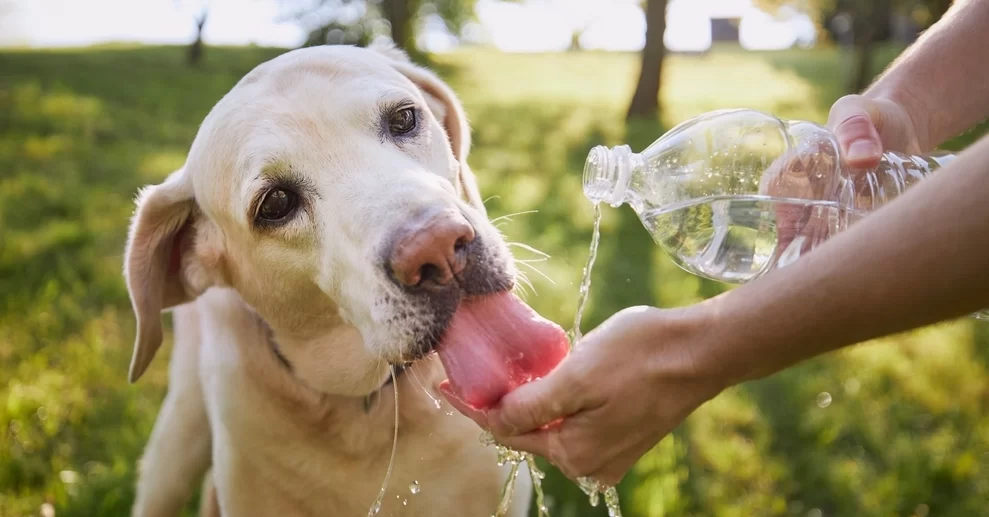The Importance of Hydration in Your Pet's Diet
As a pet owner, one of my top priorities is ensuring that my furry friend stays healthy and happy. When it comes to overall health, there’s one essential aspect that’s often overlooked: hydration. We all know how important water is for ourselves, but it’s just as vital for our pets. I’ve learned this lesson the hard way with my dog, Max, who suffered from dehydration one summer. Since then, I’ve become much more vigilant about ensuring Max stays properly hydrated. In this article, I’ll dive into why hydration is so important for your pet’s diet, the signs of dehydration, and tips to keep your pet hydrated, no matter the season.
1. Why Hydration is Crucial for Pets
Hydration is a fundamental part of any pet's diet because it directly impacts every aspect of their health. Just like humans, pets require water to perform basic bodily functions. Water is necessary for digestion, temperature regulation, joint lubrication, and overall cellular function. When pets are dehydrated, they can experience a wide range of health issues, from lethargy to organ failure in severe cases. I vividly remember the first time I noticed that Max was struggling with dehydration. He became sluggish, refused to eat, and seemed disoriented. It was a wake-up call for me to pay more attention to how much water he was drinking.
1.1 How Hydration Affects Your Pet’s Health
Dehydration in pets can lead to a host of health issues, some of which can be life-threatening if not addressed. Here are a few of the vital functions water supports in your pet’s body:
- Regulation of body temperature: Water helps your pet maintain a stable body temperature, particularly during hot weather or after exercise.
- Proper digestion: Water aids in breaking down food and transporting nutrients throughout the body.
- Detoxification: Water helps flush waste products out of your pet’s body via urine.
- Lubrication of joints: Adequate hydration is crucial for joint health, preventing discomfort and arthritis, especially in older pets.
When Max didn’t drink enough water one particularly hot summer, he showed signs of dehydration that affected his energy levels, appetite, and overall demeanor. It didn’t take long for me to realize just how essential water is for his well-being.
2. How to Recognize Dehydration in Pets
Dehydration can sometimes be difficult to spot, especially in the early stages. Over the years, I’ve learned to look for specific signs that Max might not be getting enough water. Here’s what you should watch out for:
2.1 Physical Signs of Dehydration
If your pet is dehydrated, they may exhibit some of the following symptoms:
- Dry or sticky gums: When a pet is dehydrated, their gums will feel dry to the touch, and they may seem tacky or sticky.
- Sunken eyes: This is a classic sign of dehydration, especially in severe cases.
- Loss of skin elasticity: To check for this, gently pinch the skin between your pet's shoulders. If it doesn’t spring back to its normal position quickly, your pet may be dehydrated.
- Lethargy or sluggishness: Dehydration can make your pet feel tired and weak. Max, for example, would get easily fatigued and wouldn’t want to play or go on walks.
- Reduced urine output: If you notice your pet urinating less frequently, this could indicate that they’re not drinking enough water.
When Max first showed signs of dehydration, I was concerned but relieved that I noticed early enough to take action. It’s essential to be vigilant about your pet’s water intake, especially if they’re active, elderly, or in hot environments.
3. Tips for Keeping Your Pet Hydrated
Now that we understand the importance of hydration and how to spot dehydration, let’s focus on how to keep your pet hydrated. From my experience with Max, I’ve developed several strategies that have helped ensure he stays hydrated, even on hot days or during active outings. These tips can be adapted for both dogs and cats, although cats can sometimes be more finicky about drinking water.
3.1 Make Fresh Water Accessible at All Times
The simplest way to ensure your pet is hydrated is by making sure they always have access to fresh water. I keep Max’s water bowl filled throughout the day and place it in several areas of the house so he can easily reach it. When I’m out and about, I bring a portable water bowl for him, especially during walks or trips to the park.
3.2 Add Water or Broth to Their Food
Some pets, especially those who are less interested in drinking water, may benefit from having water or low-sodium broth mixed into their food. This can be especially helpful for dry food eaters. I started adding a small amount of chicken broth to Max’s kibble, and it made him more excited about mealtime while helping him stay hydrated. Cats, in particular, may be more willing to drink water if it’s flavored with a bit of broth.
3.3 Offer Ice Cubes or Frozen Treats
Another fun way to keep your pet hydrated, especially during hot weather, is by offering them ice cubes or frozen treats. I’ve seen Max enjoy ice cubes on a hot day, and he loves when I freeze some of his favorite treats or a bit of broth into ice cubes. This method not only helps with hydration but also provides a cooling effect during the summer months.
3.4 Keep Water Cool in Hot Weather
Pets tend to drink more water when it’s cool, so during the hot months, I make sure to refresh Max’s water bowl throughout the day. If you live in a particularly hot area, investing in a pet water fountain can encourage your pet to drink more. The sound of flowing water can be intriguing to both cats and dogs, and they may drink more frequently.
4. Special Considerations for Certain Pets
While all pets need hydration, some require extra attention when it comes to their water intake. For example, older pets or pets with certain medical conditions like kidney disease or diabetes may be more prone to dehydration. Max, who is an active dog, also needs more water during and after exercise, so I’ve made it a point to monitor his hydration during outdoor activities. Cats, in particular, can be more difficult to keep hydrated because many don’t naturally drink enough water. In these cases, offering wet food can be an effective solution, as it contains a higher moisture content than dry food.
4.1 Pets with Medical Conditions
If your pet has a medical condition that affects their hydration levels, such as kidney disease or diabetes, it’s essential to follow your veterinarian’s advice about how to manage their water intake. Dehydration can exacerbate these conditions, so regular hydration monitoring is key. In Max’s case, his vet advised me to watch his water intake more closely after he was diagnosed with a mild heart condition, as dehydration could worsen his condition.
5. Hydration During Travel or Outdoor Activities
When you’re traveling with your pet or enjoying outdoor activities, it’s especially important to ensure they stay hydrated. Max loves going on hikes, but I’ve learned the hard way that pets can become overheated quickly in warm weather. I make sure to bring extra water for him during long walks or hikes, and I take breaks so that he can drink regularly. It’s also important to be mindful of signs of overheating, such as excessive panting or lethargy, which could indicate that your pet needs a break and a drink of water.
Hydration is an often overlooked but critical part of your pet’s diet. By ensuring that your pet stays hydrated, you’re helping them maintain their health, energy, and overall well-being. It’s a small effort that makes a big difference, and I’ve seen firsthand how proper hydration can keep Max happy and healthy. Keep these tips in mind, and don’t forget to check on your pet’s water intake regularly – after all, hydration is key to a long, healthy life for your furry friend.












